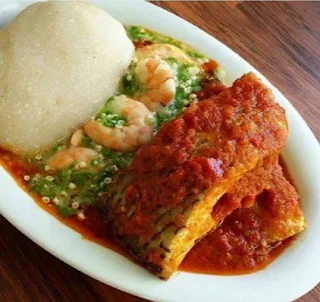In Liberia, stew and dumboy is a beloved traditional dish. The stew is typically made with a rich blend of spices, vegetables, and protein, while the dumboy is a starchy, dough-like substance that is boiled and then added to the stew as a side.
This hearty and satisfying meal is often enjoyed with family and friends and is considered a staple in Liberian cuisine, much like soup and crackers are a popular comfort food in the United States.
Liberian Stews are Amazing
Liberian stews are unlike most recipes. Liberian stews are hearty stews that combine numerous meats, fish, and vegetables in one stew. Bitter leaves alone have a bitter taste and are sold fresh or dried. The leaves are green with a robust odor and a bitter taste.
Note. There are over 200 species of bitter leaf. The leaves are used to make vegetable dishes but must be washed before eating to eliminate the bitter taste. Vernonia amygdalina, or Bitterleaf, is a widely used cooking vegetable throughout Africa.
How to Eat Dumboy
Dumboy is a dish prepared using various basic food ingredients. Dumboy is a staple food in Liberia and is what mashed potatoes are to traditional American cooking. It can be made using plantains, green bananas, cassava, yams, potatoes, cornmeal, rice, and millet.
 |
| Dumboy and Liberian Stew |
To eat dumboy, tear off a walnut-sized portion of the dumboy scoop up stew using your hands and bits of doughy dumboy. It is traditional to eat using only your right hand and no utensils. If you were to eat with your left hand, it would be both insulting and rude to those around you because usually, the left hand is reserved for bodily functions and the hand is never used for eating.
Dumboy and Liberian Bitter Leaf Stew Ingredients and Directions
Now Let's Make No So Dumb Dumboy
To eat dumboy, tear off a walnut-sized portion of the dumboy scoop up Liberian bitter leaf stew using your hands and bits of doughy dumboy.












